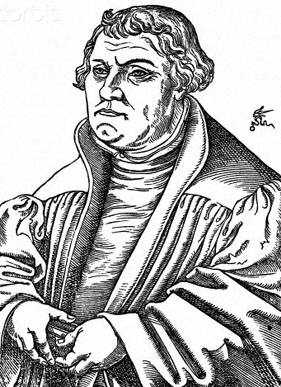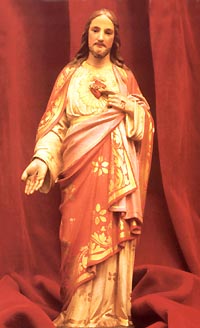International Affairs
 |
 |
 |
 |
 |
 |
 |
Luther's Appaling Instabilities & Contradictions
Seeing the despotism exercised by the head of the Reformation in
imposing his opinions, as shown
in my last article, one might imagine that nothing should be more
soundly and painstakingly elaborated than his new doctrine. Such
conclusion is completely mistaken.

His doctrine, dictated by personal whims and prejudices The false divine messenger, who "modestly" preferred himself to all the Doctors of the Church and pretended to be inspired by the Holy Ghost since he received "his dogmas from heaven," in reality is insecure, regretful about his early teachings, contradictory and arbitrary. Whether he established dogmas or destroyed them, he was motivated by trivialities and personal prejudices. He changed his opinions like an actor changing his costumes. Here are some examples:
Conditional baptism - On May 12, 1531 Luther wrote to Wenzel Link about conditional baptism, affirming that "after careful consideration we have defined that it must simply be eliminated from the Church." The next day, he changed his mind. Again "inspired," he wrote to Ossiandro: "I cannot condemn conditional baptism being given to children whose first baptism is doubtful" (1)
Power of the Catholic Church - In 1519 he wrote: "I fully confess the supreme power of the Roman Church; after Jesus Christ Our Lord, she should be preferred to everything on earth and heaven." (2) This Church "is the one chosen by God; there can be no reason for anyone to break away from her and, entering into schism, separate himself from her unity." (3) In 1520, in his Lutheran Epistle, he strongly praised Pope Leo X, saying that his courageous life placed him above any attack. (4)
However, in that same year Leo X would become the Antichrist and the Roman Church "a licentious den of thieves, the most depraved brothel, the kingdom of sin, death and hell." (5)
A 15th-century English manuscript with Bible verses on Purgatory, which Luther eliminated on a whim Saints, purgatory, prayer for the dead - In 1519, two years after he publicly started to preach his Reformation, while defending himself from adversaries, he taught the cult of the saints, the existence of purgatory, praying for the deceased, the practice of fasting etc. (6)
 He saw the Devil everywhere: in the cloud that passed, in the
lightning that struck, in the thunder that roared, in the forests,
waters, deserts, infesting the air and the fields. He saw devils hidden
in serpents and lizards, monkeys and parrots, in the fly that rested on
his book, even in the walnuts sent by an admirer. The Evil Spirit was
the one who routinely resolved every difficult problem for him. To the
Devil’s malefic action Luther attributed the moral disorders and social
calamities unchained by his subversive doctrines (16). This diabolic
obsession that tortured the soul of the unfortunate renegade can be seen
in all of Luther’s writings. Devils dominate in his style; one would say
that some of his pages were written in Hell. In the essay against Duke
Henry of Brunswick, the Devil is honored by being named 146 times; in
the book on the councils he mentioned the Devil 15 times in four lines
(17). He accused the adversaries of the Reformation of having “a
satanist, super-satanist and hyper-satanist heart.” To Luther must be
attributed the initiative of making a new genre of writing fashionable,
one dominated by the Devil, whose tune all the other reformers would
follow and sing. Are these uncertainties, doctrinal contradictions,
superficiality in inventing and destroying dogmas, and satanic arrogance
and language befitting a messenger who proposes to restore Christianity?
He saw the Devil everywhere: in the cloud that passed, in the
lightning that struck, in the thunder that roared, in the forests,
waters, deserts, infesting the air and the fields. He saw devils hidden
in serpents and lizards, monkeys and parrots, in the fly that rested on
his book, even in the walnuts sent by an admirer. The Evil Spirit was
the one who routinely resolved every difficult problem for him. To the
Devil’s malefic action Luther attributed the moral disorders and social
calamities unchained by his subversive doctrines (16). This diabolic
obsession that tortured the soul of the unfortunate renegade can be seen
in all of Luther’s writings. Devils dominate in his style; one would say
that some of his pages were written in Hell. In the essay against Duke
Henry of Brunswick, the Devil is honored by being named 146 times; in
the book on the councils he mentioned the Devil 15 times in four lines
(17). He accused the adversaries of the Reformation of having “a
satanist, super-satanist and hyper-satanist heart.” To Luther must be
attributed the initiative of making a new genre of writing fashionable,
one dominated by the Devil, whose tune all the other reformers would
follow and sing. Are these uncertainties, doctrinal contradictions,
superficiality in inventing and destroying dogmas, and satanic arrogance
and language befitting a messenger who proposes to restore Christianity?
sdfsdfsdf
Luther himself narrated the episode in detail and then concluded:
e adversaries of the Reformation of having “a satanist, super-satanist and hyper-satanist heart.” To Luther must be attributed the initiative of making a new genre of writing fashionable, one dominated by the Devil, whose tune all the other reformers would follow and sing. Are these uncertainties, doctrinal contradictions, superficiality in inventing and destroying dogmas, and satanic arrogance and language befitting a messenger who proposes to restore Christianity?
Summarized and translated by the TIA desk from Cornelius a Lapide,
Commentaria in Scripturam Sacram, Paris: Ludovicum Vides, 1876, vol. 21, chap. 21
Posted October 8, 2011

caption
His doctrine, dictated by personal whims and prejudices The false divine messenger, who "modestly" preferred himself to all the Doctors of the Church and pretended to be inspired by the Holy Ghost since he received "his dogmas from heaven," in reality is insecure, regretful about his early teachings, contradictory and arbitrary. Whether he established dogmas or destroyed them, he was motivated by trivialities and personal prejudices. He changed his opinions like an actor changing his costumes. Here are some examples:
Conditional baptism - On May 12, 1531 Luther wrote to Wenzel Link about conditional baptism, affirming that "after careful consideration we have defined that it must simply be eliminated from the Church." The next day, he changed his mind. Again "inspired," he wrote to Ossiandro: "I cannot condemn conditional baptism being given to children whose first baptism is doubtful" (1)
Power of the Catholic Church - In 1519 he wrote: "I fully confess the supreme power of the Roman Church; after Jesus Christ Our Lord, she should be preferred to everything on earth and heaven." (2) This Church "is the one chosen by God; there can be no reason for anyone to break away from her and, entering into schism, separate himself from her unity." (3) In 1520, in his Lutheran Epistle, he strongly praised Pope Leo X, saying that his courageous life placed him above any attack. (4)
However, in that same year Leo X would become the Antichrist and the Roman Church "a licentious den of thieves, the most depraved brothel, the kingdom of sin, death and hell." (5)
A 15th-century English manuscript with Bible verses on Purgatory, which Luther eliminated on a whim Saints, purgatory, prayer for the dead - In 1519, two years after he publicly started to preach his Reformation, while defending himself from adversaries, he taught the cult of the saints, the existence of purgatory, praying for the deceased, the practice of fasting etc. (6)

caption
sdfsdfsdf
Luther himself narrated the episode in detail and then concluded:
e adversaries of the Reformation of having “a satanist, super-satanist and hyper-satanist heart.” To Luther must be attributed the initiative of making a new genre of writing fashionable, one dominated by the Devil, whose tune all the other reformers would follow and sing. Are these uncertainties, doctrinal contradictions, superficiality in inventing and destroying dogmas, and satanic arrogance and language befitting a messenger who proposes to restore Christianity?
- Martin Luther
- Some else
- footnote 3
- in his commentary on the Epistle to the Romans, Luther had already moved away from the Catholic tradition and was teaching bold errors about concupiscence, original sin, justification, free will and grace. From 1515 on, he was already ripe for apostasy. The preaching of Tetzel only served to trigger that irremediable break.
Summarized and translated by the TIA desk from Cornelius a Lapide,
Commentaria in Scripturam Sacram, Paris: Ludovicum Vides, 1876, vol. 21, chap. 21
Posted October 8, 2011
______________________
______________________








